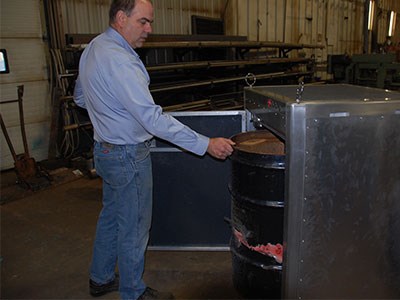Mike Rudnicki's Thunder Bay machine shop is a mecca for inventors and entrepreneurs with big ideas.
The owner and president of Rudnicki Industrial has built a stellar reputation as an innovator, a sounding board, a troubleshooter, and, most especially, a helping hand for the less mechanically inclined.
“That’s one of my specialties, one of the things that I really thrive on,” said Rudnicki, who estimates he's assisted with 15 to 20 startup companies in the city. “I find it to be an integral part of what we do. The truth is there’s no money in it.”
Rudnicki's open door policy for walk-in business and his willingness to take on apprentices earned him an Innovation Hero award from the Northwestern Ontario Innovation Centre and garnered his company a Thunder Bay Chamber of Commerce award for business excellence in 2011.
“Somebody will bring something in and they can’t figure out why it doesn’t work,” said Rudnicki. “I'll say, well, you’re looking at the symptom, not the disease. So let’s get to the bottom of what the actual disease is and fix it.”
Rudnicki's extensive experience in the manufacturing process and his approachability has made him a custom fit to work with inventors.
“I think this allows me to use by problem-solving skills and use my creativity to work on development of projects. To me, it’s all art.”
Trained as a machinist, Rudnicki worked for a number of Thunder Bay shops in the late 1980s and early 1990s before turning his garage-based side business into a full-time gig.
Along with business partner and shop foreman, John Sved, they eventually migrated out to Dawson Road (Highway 102) and into a modest 6,000-square-foot shop which is crammed with both conventional and CNC lathes, presses and milling machines.
In those early days, Rudnicki remembers the city's economy being so robust, with sawmills and machine shops going flat out, “there weren't enough machines and bodies to go around.”
But rather than tie the company's fortunes to sawmill repairs, Rudnicki realized he needed to diversify.
“It started with Hurricane Katrina in 2005 when I realized that the U.S. did not rebuild (New Orleans) very quickly. I knew that the lumber industry was going to take a big hit.”
He invested in CNC milling machines, enabling the company to design and build equipment and custom parts to handle most any industrial job in the city.
“It was an evolutionary system that we just grew by each machine and we started producing products like it was going out of style,” said Rudnicki. “We recognized there were better ways to do the jobs more efficiently and become more creative.”
The company's client mix includes the mining and forestry sectors, and small to medium-sized businesses. With the addition of a 3D printer for proof of concept and prototype development, they've made camera mounting devices for a local film equipment company, components for an avionics company, and even dabbled in prosthetics.
Rudnicki remembers one walk-in customer, who had severed his thumb with a skill saw, and wanted an artificial appendage so he could keep playing the guitar.
Son Chris, a certified Solidworks software professional, designed a stainless steel prototype on the 3D printer, complete with finger nail.
“We needed him to come back for some measurements so he could try it on,” said Rudnicki, “but he never followed up.”
Rudnicki's creative juices has resulted in some inventions of his own. He designed and built a heavy- duty brush cutter and a high-speed machine – the Strap Eater – that chews up reams of discarded steel banding and spits it out into four-inch lengths for easy transport to the recycler.
His most promising project is a portable barrel crusher that he hopes to market sometime in 2014.
For companies working in remote camps, leaving industrial waste behind can be hugely problematic for Aboriginal people.
When an aviation client asked Rudnicki if he could build a crusher that could be easily slung into an aircraft, he developed the Pac-O-Drum.
At 300 pounds, the electrically-powered unit pancakes a 45-gallon drum to a height of five to seven inches within a three-minute cycle time.
“Where once there was one barrel now you could stack seven.”
The unit uses no oil or hydraulics and runs off a 3,000-watt generator Rudnicki still has some mechanical tinkering to do before he launches it commercially next year for a per unit pricetag of about $12,000.
“I’m working on another gear box that will bring that cycle time down to two minutes.”
Rudnicki has eyes on growing the company with a focus on manufacturing effiencies, not through a physical shop expansion.
“I'd like to grow it on a few independent products and deal with the customers we work with, staying diversified but becoming very efficient.”
Staying small, flexible and agile, he said, is the way to go.
“Where it takes me, I'm just going to go with the flow, but do it conservatively enough so we're not faced with the financial burdens and stresses.”




